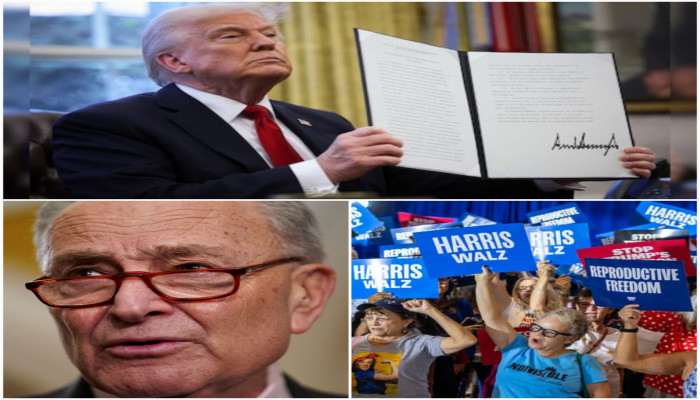Trump suggests third term, alters voting system, faces lawsuit from Democrats
- In Reports
- 01:32 PM, Apr 02, 2025
- Myind Staff
Just days before Donald Trump declared he was "not joking" about seeking a third term as US President, he exercised his executive authority to implement significant changes to America’s voting system. This decision has now led opposition Democrats to take legal action against him. "It is simply not within the president's authority to set election rules by executive decree," according to a statement released by the advocacy group Campaign Legal Centre following the filing of the lawsuit in a US court.
As part of the significant changes to the US electoral process mandated by President Trump, some measures have raised concerns among analysts. These include requiring voters to personally register by providing documents that prove their US citizenship; otherwise, they would be ineligible to vote. Another key change is restricting the counting of mail-in ballots that arrive after election day.
The Democratic Party, concerned about the potential impact of these changes on millions of voters and the election outcome, has called on the federal court to block the President's executive order. The lawsuit, filed in Washington by the Democratic National Committee, Senate Minority Leader Chuck Schumer, House Minority Leader Hakeem Jeffries, and others, argues, "The President does not get to dictate the rules of our elections."
Explaining the changes as "radical," the lawsuit against Trump states, "The executive order seeks to impose radical changes on how Americans register to vote, cast a ballot, and participate in our democracy - all of which threaten to disenfranchise voters." It further asserts, "None of this is legal."
On March 25, Donald Trump signed a presidential order, ‘Preserving and Protecting the Integrity of American Elections’, calling it "the farthest-reaching executive action ever taken." He stated that the order was necessary to secure U.S. elections from "widespread rigging."
Trump has never accepted his defeat in the 2020 U.S. presidential election and continues to challenge the integrity of the electoral system. He has been outspoken about what he claims to be "massive election fraud," particularly regarding "absentee voting." A group of legal experts supporting the Democratic Party’s lawsuit against Trump has criticised the order, calling it "an abuse" of presidential power. They argue that the changes it introduces will "prevent millions of voters from casting their ballot." In a statement, they warned, "The president's executive order is an unlawful action that threatens to uproot our tried-and-tested election systems."
Donald Trump has emphasised that only those with proper documentation proving their citizenship, such as a passport, should be allowed to vote. He cited India as an example, praising the country’s voter card and Aadhaar card system for ensuring proper voter registration. While his current presidential order does not propose any changes to term limits, Trump has expressed interest in pursuing a third term in office. This event happened once in U.S. history before a constitutional amendment established the two-term limit. Under the U.S. Constitution, a President can serve only two four-year terms, consecutive or non-consecutive, for a maximum of eight years. For Trump to run for a third term, his party must pass a constitutional amendment, a challenging process requiring strong support in both Congress and the majority of the 50 states.
In a phone interview with NBC News, Donald Trump clarified his stance. When asked about a potential third term as President, he stated, "No, I'm not joking. I'm not joking (about a third term as President)." However, he also noted that "it is far too early to think about it," given that his second term had only just completed two months. When questioned about how he might pursue a third term, Trump responded vaguely, saying, "There are methods by which you could do it, as you well know," but refused to provide further details or specifics on his plans.
For Donald Trump to serve a third term, he and his party must amend the 22nd Amendment of the U.S. Constitution. However, overturning a constitutional amendment is a challenging process that requires a two-thirds majority in both houses of Congress and approval from the legislatures of three-fourths of the 50 states. Some of Trump's allies have suggested keeping him in office beyond 2028. If he were to win another term in the November 2028 election, he would be 82 years old by the time he took office, having already been the oldest U.S. president at 78 when he was inaugurated. Although America's first president, George Washington, set the precedent of stepping down after two terms in 1797, the formal two-term limit for presidents was only established more than 150 years later.
Franklin D. Roosevelt is the only U.S. President to have served more than two terms. A Democrat, he was elected four times, in 1932, 1936, 1940, and 1944, but his fourth term was cut short by his death on April 12, 1945, at 63.
Other former Presidents, including Ulysses S. Grant and Theodore Roosevelt, attempted to secure a third term but were unsuccessful in winning the nomination or re-election.
In response to Roosevelt’s unprecedented tenure, the 22nd Amendment was passed in 1947, limiting Presidents to two terms. Two-thirds of the House and Senate approved it, later ratified by three-quarters of the U.S. state legislatures in 1951.







Comments